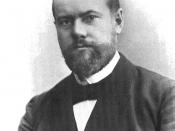Through the 1900s a lot of work on management has been presented to the world. The work of writers in management can be categorised in four main approaches: classical, human relations, systems and contingency. Typical classical writers from the early 1900s, such as Fayol, Brech, Urwick and Mooney and Reiley, main emphases were on the formal organisation and structure. The classical approach can be divided into two subgroups: the bureaucracy and the scientific management. Max Weber is seen as the most important management thinker of bureaucracy within this field. Taylor is seen as the "father" of scientific management thinking. The classical writers have been criticised for not looking at the employees as individuals with different personality and personal needs. However, their work is still relevant today in the UK. Their structural factors are still used in some organisations. (Mullins)
During the 1920s the main emphasis was put on the social factors at work and on the behaviour of employees within an organisation.
This is the human relations approach. In the period 1924-1932 researchers performed the famous Hawthorne experiments. These experiments investigated how different groups of workers reacted when they were influenced by different factors, such as light, longer breaks, commission payment and a personal interview programmes. Mayo is one of the most well known writers about these experiments, which have been heavily criticised. They were not enough concerned about the environmental or the social factors. On the other hand, the Hawthorne experiments did take management to another level. Factors like motivation, job design and team work were now seen as more relevant within management thinking. (Mullins)
The results of the Hawthorne experiments gave rise to the neo-human relations in the 1950s and 1960s. Within this field Maslow, Herzberg and McGregor were concerned about a more psychological orientation related to...


